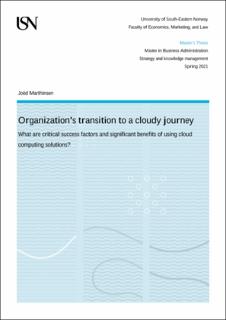| dc.description.abstract | The cloud computing paradigm has existed for a long time but has gained momentum in the last decade. The emergence of Covid-19 accelerated this trend enabling cloud technology to demonstrate its disruptive capabilities. Thus, more organizations are aware of the need to go cloud. However, what it means is a different story. A transition to the cloud has various complexity levels and necessitates proper understanding to reap full benefits.
The goal of this study was to grasp the cloud computing phenomenon in a strategic management context through the following research questions:
What are critical success factors when organizations are transitioning to the cloud?
What are significant benefits when organizations are transitioning to the cloud?
This qualitative study relied on the foundation of a systematic literature review and in-depth interviews to build a case around essential preconditions when organizations opt for cloud solutions. This research took place from January 2021- June 2021.
Nine participants from the technology industry operating across countries devoted their knowledge by providing rich deep data concerning organizations transitioning to cloud computing solutions.
The theoretical perspectives of Resource-based theory, Knowledge management, Transaction Cost Theory, and Self-Determination Theory provided a foundation for further data collection.
Four significant critical success factors emerged from the interviews:
Readiness was necessary to align the proper cloud strategies with organizational needs and culture.
Competence was inherent due to the vast complexity of the cloud paradigm and the dynamic environments organizations operate.
Transaction Costs were essential to raise awareness around unanticipated costs of going cloud and the importance of engaging in relational governance.
Technology was a means to an end, but a complex one demanding extensive expertise in given contexts.
Together, cloud computing solutions in light of these factors would generate benefits such as increased agility and computation power, technological capabilities enabling organizations to adapt to an ever-changing digital environment faster and gain strategic advantages. Economic gains would ensue from that but demanded a proper alignment between these critical success factors enabling strategy, governance, and optimization processes to create synergies along strategic, organizational, technological, and economic dimensions.
This study helped demonstrate the inherent need for proper knowledge in various aspects of cloud solutions and building strategic relationships to operate advantageously in today's business ecosystems. Moreover, it
exposed the lack of cloud-specific expertise pertaining to a critical need for academics and businesses to cooperate to ensure a happy cloud journey for organizations in the future.
Despite the limited generalization value of this thesis, it has excellent informative value for business decision-making related to cloud computing solutions and academics seeking research inspiration. | |
